How To Draw A Horse Emma Hunsinger
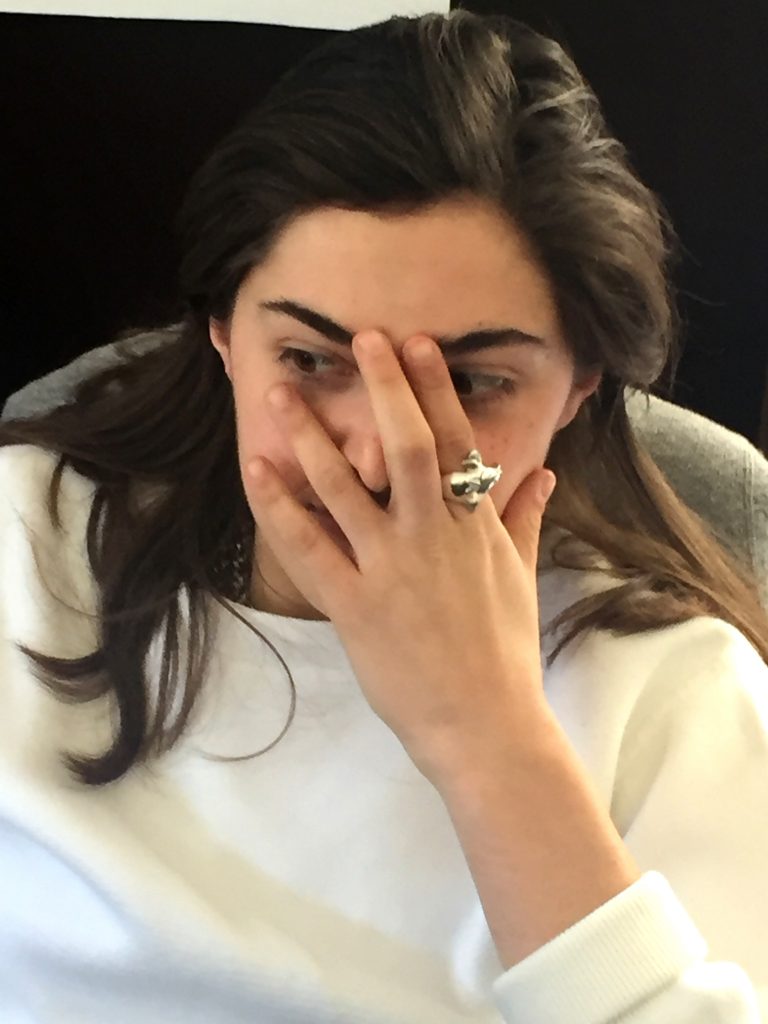
At that place are many things you need to know about rising star Emma Hunsinger. Despite still being in her twenties, she's having the kind of career that most cartoonists only dream about. For case, she merely had a ten-page spread published in The New Yorker (yes, ten pages, longer than whatever comic in the history of the magazine). There are agents and editors swirling around her. She's had offers for books and anthologies. And she'south in the midst of finishing her second twelvemonth at The Center for Drawing Studies, where her thesis adviser is none other than Tillie Walden, ane of the most successful artists to graduate from the school.
But hither'southward something else yous need to know about Emma Hunsinger: she's really, really cool. She's equally self-deprecatingly funny and intuitively bright equally her comics. As Emma and I talked over breakfast, I plant myself wanting to hear about her process of making comics besides as also wanting to programme for a road trip similar we were best pals.
If you haven't read Emma's breakthrough New Yorker cartoon, "How To Depict a Horse" it'due south well-nigh a young girl's fascination with drawing horses and using that to get closer to another daughter in her form. Information technology'due south bad-mannered and honest but also hilarious. Her kickoff-yr, "mini-thesis" project at CCS was a comic called "Clamper," which Rob Clough listed as one of his favorites of the decade. In "Chunk," Hunsinger follows a grouping of art students in a sculpture class who autumn in beloved, fall out of love, and come to terms with life and its lessons. Plus, it somehow manages to include several pages of a sex activity fantasy with Wonder Woman. In other words, it'southward amazing.
Here'south something else to know nearly Emma: she has wanted to do this her entire life. While other kids dreamed of being astronauts and professional baseball players, Emma told her teachers that she wanted to write comics for The New Yorker, which makes all this early on (and deserving) success even more thrilling to those of the states who are her classmates at CCS.
Emil Wilson (EW): I'1000 going to commencement off with a big question to go the ball rolling. Are you an artist who writes, a writer who draws, or neither?
Emma Hunsinger (EH): It'south funny considering I feel similar I talk about this a lot. I know what my drawings look like and I know I'm non the best creative person in the world. But I also know I'one thousand not the worst. I've never been interested in writing prose or verse. Then I guess the answer by default is neither. That'due south what I love nearly comics. Information technology'south like tricking people into thinking you're actually talented, when your existent talent is knowing how to combine a lot of things you're sort of adept at to make something greater than the sum of its parts. I call up if you typed out all the text in my comics it would read similar histrionic high schoolhouse poetry.
EW: Okay, and then then what are the things you're adept at when it comes to making comics?
EH: Having fun, particularly when I'm drawing. I make myself laugh when I draw. It's happened a few times in the (senior fine art) studio. I'thousand in the first room and the people in the other room will hear me giggling and I'm all past myself considering I'm cartoon something that'due south making me laugh. It'due south a trouble too, though; if I draw something I really like I stand cause I'1000 so excited, and and so one time I'm up I usually get distracted.
EW: What makes yous express mirth?
EH: I actually express mirth when I discover a good manner to hide something in a drawing. It's rare but information technology has a high payoff. My favorite affair to do when I was regularly submitting New Yorker cartoons was to describe posters for things in the background of the cartoon. I continue drawing people in the dermatologists office so I can put in a poster for "lumps and bumps."
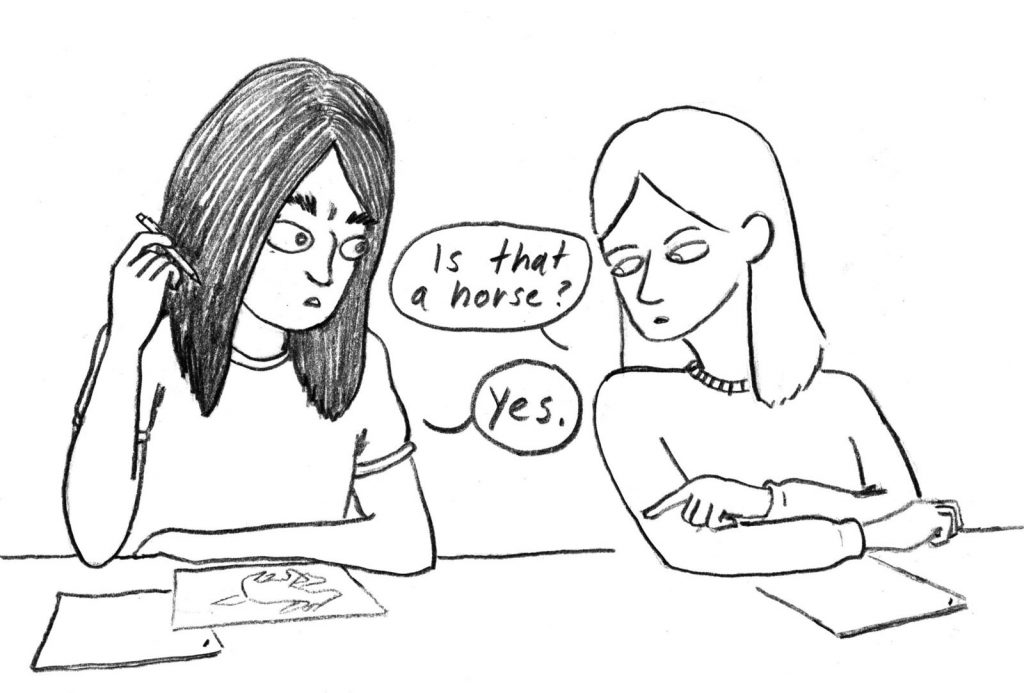
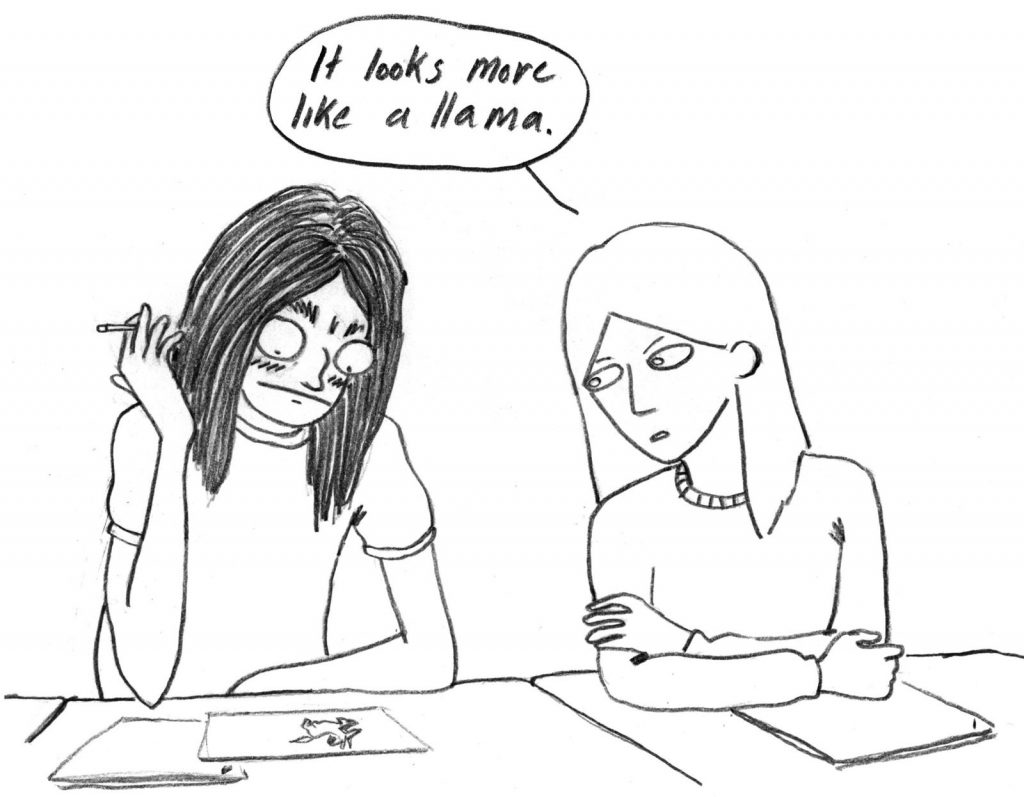
EW: Tell me about your background and what led you to comics.
EH: I always wanted to be a cartoonist: I submitted my commencement cartoon to the New Yorker when I was 12. We had this projection in seventh grade where you accept to practise a history of yourself and what you expected of your future cocky. I wrote that I wanted to sell cartoons to The New Yorker BEFORE I got to high school; I gave myself 1 yr to start selling gag cartoons to The New Yorker.
I got into comics freshman twelvemonth of loftier school: my history instructor was new to the school and was very enthusiastically starting a "Graphic Novels Club." I didn't know what a graphic novel was and was actually curious, but also terrified of doing anything that could exist perceived as 'uncool' so I didn't join. And so one day he caught me drawing a worksheet in form and told me in forepart of all the lacrosse boys that I should come to the Graphic Novels Club. I was mortified but the whole affair somehow fueled the fire and I was desperate to actually encounter what a graphic novel was.
The instructor helped commencement a graphic novel section in the schoolhouse'south library that I was, of course, too terrified to look at, lest someone recollect I was a nerd or something. I went in during lunch one day when the library was sort of empty and I could finally wait at the graphic novels section without being seen. I decided that when I had the adventure, I would check out this one graphic novel called Blankets by Craig Thompson.
Of this whole story, this is the thing I call up the well-nigh vividly: Right before Christmas break I was in the library with the basketball squad (I was on the JV basketball team) and I knew I could NOT wait another week. So I went and grabbed Blankets off the shelf, checked it out, and HID IT Under MY SWEATSHIRT, and so that none of the basketball girls would ask me most it and slipped it into my haversack.
I literally could not await to read this book. That night we had to get to a Christmas party and I didn't intendance. I sat on the couch at our friend's house the entire time and read Blankets. I'd never been then into anything in my life. I swear I couldn't hear anything around me. I was getting my world rocked by this book. I had never seen anything like information technology. I read every graphic novel in the school's library, and when I finished that, read almost every i at the public library over the class of my next iv years in high school.
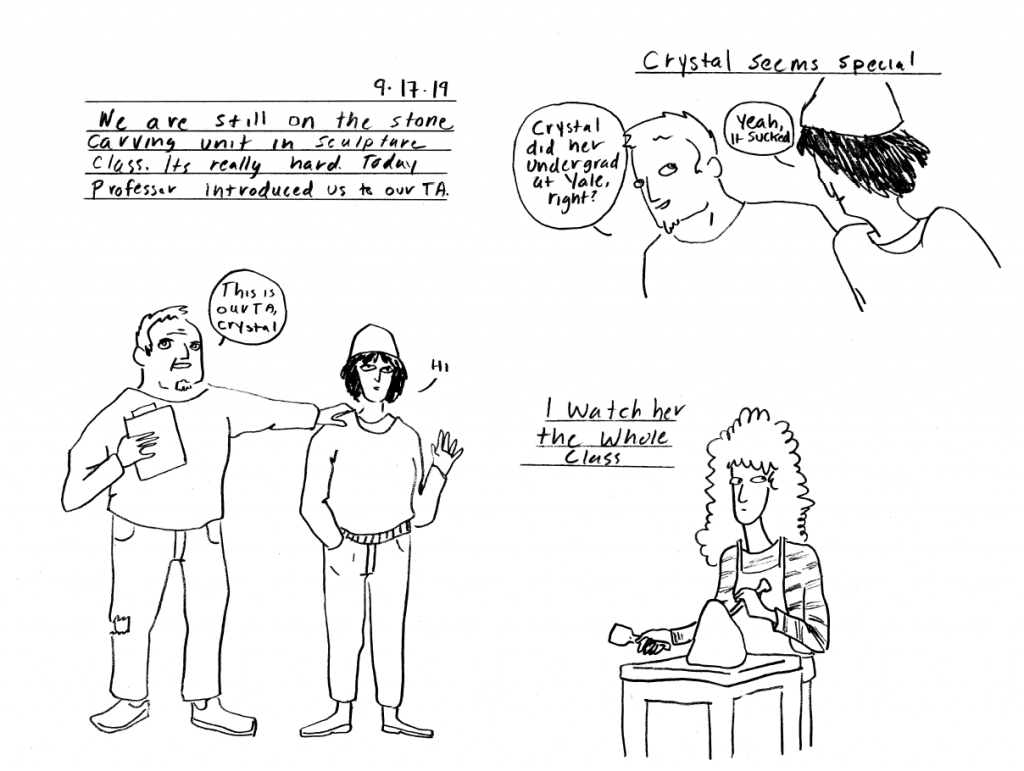
EW: How does it feel now that you've achieved getting piece of work into The New Yorker and fulfilling your 7th-grade dream?
EH: It'south so anticlimactic. I wanted this for so long and, when I finally got the copy of the magazine, I was continuing alone in my apartment and there was my name in The New Yorker and I thought Okay, I did it. Then I merely put it on a shelf and haven't looked at it since. You work so hard before you get in that location. Earlier I sold a drawing I submitted perhaps hundreds of cartoons. I learned a lot of lessons that have really served me. The best lesson was how to get rejected. They'd say that I was close, just no. Or at that place'd be radio silence. The New Yorker gets a thousand cartoons a week, so they can't answer to anybody who submits. But getting rejected helped me understand why I'yard doing this. I'm non doing this because I desire to have the most cartoons in The New Yorker. I'k doing this considering I have ideas that are fun. I also learned a proficient lesson about the editors' tastes. At that place are some cartoons that The New Yorker simply can't have. You could arts and crafts the perfect joke; millions and millions of people will love this joke and it'll exist 1 of the greatest gags always, but if a majority of The New Yorker audience won't understand it, then the magazine won't buy it. I learned to non take that personally. That editors take a job to do and their rejection doesn't say you're no good, information technology mostly says "it's not right for usa."
With "How to Draw a Horse" in the magazine it's similar, what more could I desire? I've stopped thinking well-nigh cloth goals like selling a volume (though I would love to sell a book). What's important to me is to keep making piece of work that's good. A lot of people said a lot of really prissy things almost "How to Draw a Horse" and I set up the bar really loftier for myself.
EW: How does that bear on your thesis and the work you're doing right at present?
EH: For my thesis it became pretty clear right off the bat that this would exist a good time to observe then strop my procedure. Before CCS, I was doing gags and no long-course stuff at all, so I've taken this twelvemonth to figure out how I work. And that's been what'south really of import. I'm trying not to call up about career moves and focus instead on how I become the best work out of myself.
EW: And what have you lot discovered?
EH: I'm trying to best effigy out how to get unstuck. I'm writing this little comic and I go along getting miserably stuck in the story. I learned information technology's really important that when I get stuck I need to stop working and do something else. Correct now, my hobbies are walking or taking a shower or lying downward and thinking. Sometimes I walk to the gas station and treat myself to a Gatorade or some mucilage. Every now and then I volition drink one beer and play Vivaldi'due south The 4 Seasons actually loud. Going to the movies helps too. These are my hobbies for real, I'one thousand what y'all would call "very ho-hum." I mean, I'm a fun person but I don't exercise much; I'll probably develop more of a life afterward I graduate.
EW: How would yous depict your work?
EH: My work is over-dramatic, merely it isn't totally nauseating because it'due south also pretty featherbrained. My dad ever says "you tin pretend to exist serious, but you can't pretend to be funny." Information technology's i of his dad-sayings (every dad has them), so I heard it a lot and it really fabricated me think about the relationship betwixt serious and funny. I recall for me, in my work, to make something actually emotional there has to be a balanced amount of foolishness. It's how life is and so information technology makes things more real.
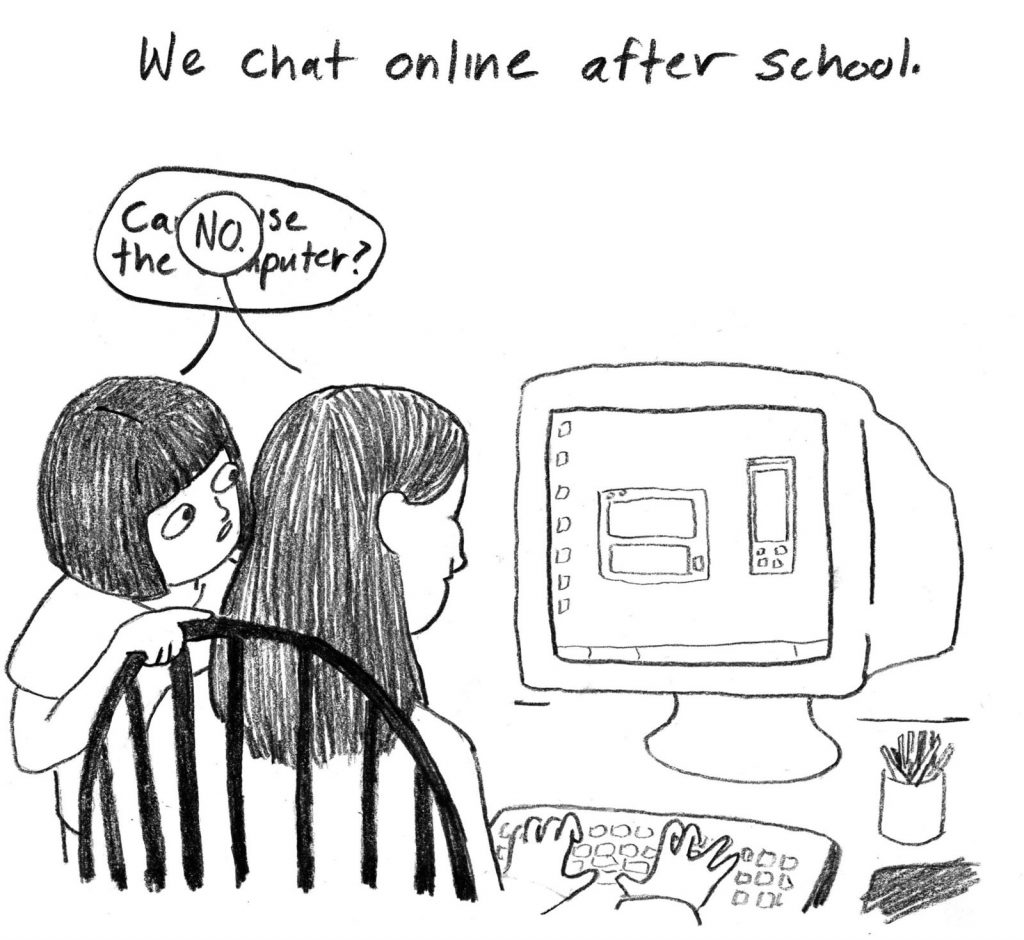
EW: What'south information technology been like coming out through your comics?
EH: That'southward a skilful question, especially since I never had a existent coming out. I eked out of the closet. When my comic got published, it was when a lot of people in my life found out I was gay. Looking back, information technology was a great style to exercise it. I don't like coming out. I'm a little bit straight-passing cause I accept long hair. But it'southward been a relief for me considering I don't have to explain myself; you can just read it. It feels okay to be open and vulnerable in my work and that's the stuff I dearest to read anyhow. And it seems to be the work that other people enjoy reading too.
EW: Who influences you?
EH: Casey Nowak'south Diana's Electric Natural language. That was one of the starting time comics I read that got me really excited. That story felt like A STORY. I love Eleanor Davis. I love Mickey Zacchilli considering her piece of work is and then wild and so evocative and it always makes me laugh. I took a class from Patrick Crotty at the RisoLAB at SVA. I love his work. Freddy Carrasco and his book Hot Summer Nights. Carta Monir on ZEAL had this comic chosen Lara Croft is my Family unit and that paved the style for "How to Depict a Equus caballus." In that comic, she talks about family vocabulary and it was then similar to the experience with my family unit. It made me realize that if you can pinpoint these piffling, little moments that happen to everybody but are hard to depict, and so it'south really beautiful for a reader to encounter it. I but got Disa Wallander's new book; I would like my piece of work to be as delightful as hers.
EW: What would y'all do if y'all weren't making comics?
I've been asked that question before and before I answer it, I need to get more specifics on the scenario. Practice I have all the talent and ideas that I have now or am I a totally different person?
EW: You lot have all the talents you have at present. Merely yous can't brand comics.
EH: I'chiliad not letting myself?
EW: They outlaw yous. Y'all're banned from comics. Yous have to go find other work.
EH: (laughs) Oh okay. Wow. I'g going to presume then that I'm miserable. So then I'd be a mailman. Lately I've been craving stability almost more than annihilation, and people will e'er demand the postal system, so in that location's security in that. I also love walking and uniforms. I'yard dull, retrieve? Existence a mailman would keep me baseline happy while I was outlawed from comics.
EW: Tell me about your experience with The Eye for Drawing Studies. What brought you here?
EH: I was technically a professional cartoonist selling work to The New Yorker, but I felt my cartoons didn't await very professional person. I was really frustrated with my art and felt like I didn't know what I was doing. I wanted to be better. I had the opportunity to come here, which has been huge. I'd never been a proficient student before I got here. I take nigh no attention span, only and then I came hither and got to do this thing that I'm crazy about and I became a slap-up educatee.
I was happy to get out of New York. And information technology was so nice to exist effectually people who were doing this. Everyone in my class is doing really unlike work and everyone has such different goals. Simply we're linked by this drive to be cartoonists. I loved my start yr hither. I loved rising to the occasion. I take a really special, fun, interesting group of people in my class. I couldn't accept done "How to Draw a Horse" without them. For my big consignment at the finish of the first year, I did "Chunk," which was super informative for me. Beginning, because I didn't utilize panels and the whole thing felt really different. At the time, I was working at a local impress shop, and so I was printing stuff for other people and information technology had to wait really professional. I got a lot of insights about how I wanted "Chunk" to await. I knew I wanted it perfect-bound and that I wanted it to be 300 pages, which looking dorsum at present was crazy. I ended up settling for 112 pages, which is yet a lot.
EW: And how'southward the 2d year? What's it like working on your thesis with Tillie Walden?
EH: For the second year, the large departure is that it's all on you. At CCS, you get out what yous put in. The first year, I pushed my limits and went all in. I took a lot of opportunities. For the second year, you lot have to fix your schedule yourself. I'm lucky that my schedule is flexible so I tin pour a lot of time into my thesis. I love working with an advisor and working with Tillie is amazing. I think Tillie and I are a really proficient fit. I asked for her considering over the summer I was getting a lot of attention from Heart-Grade publishers and I was thinking about writing for young people which Tillie does exceptionally well; plus she had gone to the schoolhouse herself, which is an advantage when picking an advisor considering they know what's expected of you and such. I'm so glad she said yes, I've had the best time working with her.
Tillie gave a Visiting Artist lecture last year and she talked most her procedure and working spontaneously. I piece of work that manner too. Lately, I've been thinking about the feedback process. I can imagine a version of myself that doesn't want to accept advice from anyone, merely there's been work that I've shown Tillie, and she'll betoken out things to pay attention to and information technology'due south incredibly helpful. It takes a while to trust other people to know what'southward all-time with your piece of work. But Tillie has fabricated my work so much better.
EW: When yous recall about your craziest dreams for the future, what comes to mind?
EH: I have this nonsense dream of being the author on The L Discussion. I don't know why, I never even watched the original. I just experience similar I'd enjoy it. If at that place were a way to be a mailman and a cartoonist, you know I'd exercise that.
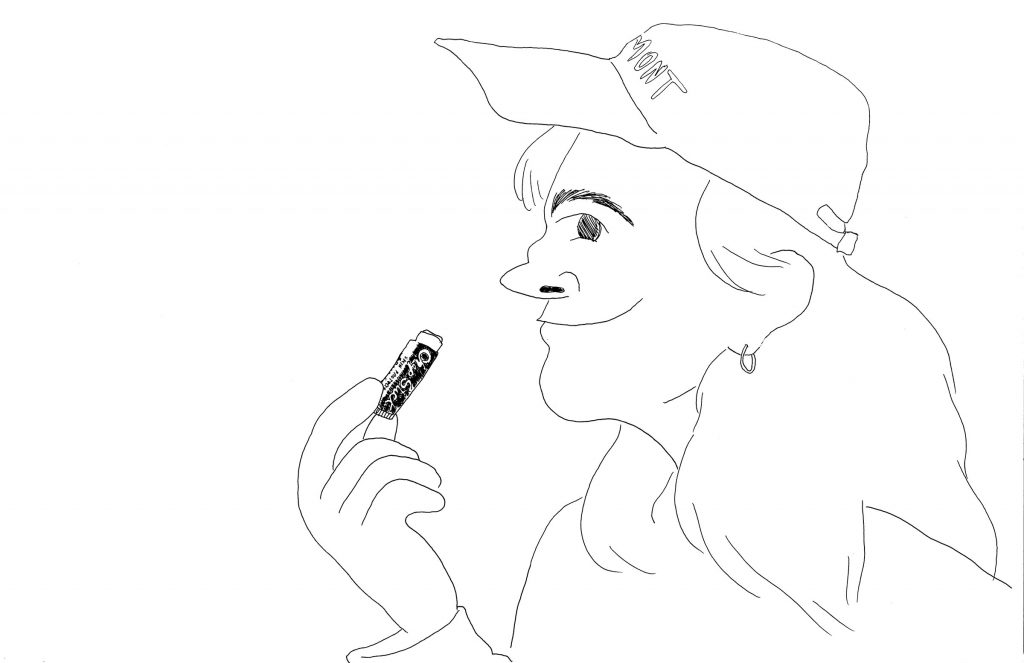
Source: https://solrad.co/emil-wilson-interview-emma-hunsinger

0 Response to "How To Draw A Horse Emma Hunsinger"
Post a Comment